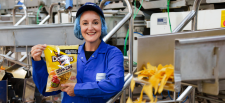With core commodity food prices having risen as much as 43% and energy prices rising by over 40%, 2022 has demonstrated how quickly and significantly today’s supply chains can be disrupted and the knock-on effect to businesses and consumers.
This is according to Efficio’s latest report, Category & Insights Outlook 2023, which takes an in-depth look at the current situation across six industries that have experienced significant change over the last 12 months including Food & Agriculture, Energy, Industrial & Chemicals, Metals, Logistics, and Temporary Labour.
The report outlines the trends that businesses have been forced to navigate as a result of soaring inflation rates, as well as outlooks for these industries in the short and medium term. It also provides guidance (where available) on how businesses can overcome, and even prosper in, these challenging times.
The Food & Agriculture industry has witnessed steep rises in core commodity prices and shortages in 2022 and this is carrying on into 2023 due to high inflation rates and the cost of energy, with big supermarkets – including Tesco, Aldi, and ASDA – recently limiting product sales.
However, although other sectors such as Industrial & Chemicals and Logistics have witnessed high volatility in 2022, these industries are predicted to stabilise in 2023 with regard to both the supply and demand.
According to Efficio: “This year, businesses will have to navigate a completely different economic environment. We have not seen such a combination in years – from high inflation rates to geopolitical uncertainties to energy insecurity and supply chain disruptions. In addition, there is now a growing need and demand for businesses to innovate and also to protect the environment.
“While we do expect inflation to drop in the latter half of 2023, and energy and food prices to decrease, businesses will still have to contend with disruptions caused by the Ukraine/Russia war and environmental impacts. Nearshoring and re-shoring are expected to take hold this year as a result of uncertainty around global economic activity.”
Other key findings from the report include:
- Air freight – in particular, global jet fuel prices – has reached an 8-year high since 2014.
- Due to supply chain disruptions, fewer containers have moved from Asia to Europe, contributing to a 30-40% price drop since January 2022.
- Over the last 12 months, the prices for milk and chicken have increased by over 40% as a result of inflation and weakened consumer demand.
- Due to environmental impacts and high inflation, eggs, beef, and corn have seen price increases of over 20%.
- Energy prices have increased by over 40% in the last 12 months, and while prices have fallen since it is unlikely prices will drop below pre-Ukraine/Russia war in the short to medium term.









